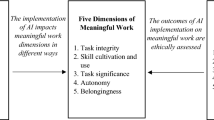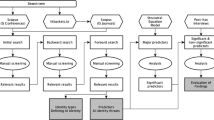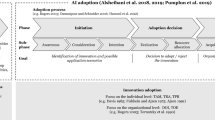Abstract
Within this article, the authors argue that intelligence management (IM) as a research area is critical for organisations. There is a need to focus on how conceptualisations of intelligence can be supported, especially when one considers the crucial role it plays in the highest echelons of most organisations. A conceptual view of IM is developed from the Problem Structuring Method, which provides a viable framework for addressing problems that are constituent of multiplicities in terms of not only actors, but also perspectives. Data are obtained for participation observation and action research. The study finds that organisations may need to concentrate on the human side of IM by embellishing the role of intelligence managers.



Similar content being viewed by others
References
Argyris, C. and Schon, D. (1991) Participatory action research and action science compared. In: W.F. Whyte (ed.) Participatory Action Research. Newbury Park, NJ: Sage, pp. 85–96.
Berger, P. and Luckman, T. (1967) The Social Construction of Reality: A Treatise in the Sociology of Knowledge. Garden City, New York: Penguin.
Boder, A. (2006) Collective intelligence: A keystone in knowledge management. Journal of Knowledge Management 10 (1): 81–93.
Cook, C. and Cook, M. (2000) The Convergence of Knowledge Management and Business Intelligence. New York: Auerbach Publications, www.brint.com/members/online/20080108/intelligence/, accessed 8 July 2009.
Earl, M. and Scott, I. (1999) What is a chief knowledge officer? Sloan Management Review 40: 29–38.
Erden, Z., von Krogh, G. and Nonaka, I. (2008) The quality of group tacit knowledge. Journal of Strategic Information Systems 17 (1): 4–18.
Gersh, J., Lewis, B., Montemayor, J., Piatko, C. and Turner, R. (2006) Supporting insight-based information exploration in intelligence analysis. Communications of the ACM 49 (4): 63–68.
Gibson, M., Arnott, D., Jagielska, I. and Melbourne, A. (2004) Evaluating the intangible benefits of business intelligence: Review & research agenda. Proceedings of the 2004 IFIP International Conference on Decision Support Systems (DSS2004): Decision Support in an Uncertain and Complex World: 295–305.
Gordon, T. (1992) Artificial intelligence: A hermeneutic defense. In: C. Floyd, H. Zullighoven, R. Budde and R. Keil-Slawik (eds.) Software Development and Reality Construction. Springer, pp. 280–290.
Hansson, J. (2005) Hermeneutics as a bridge between the modern and the postmodern in library and information science. Journal of Documentation 61 (1): 102–113.
Li, S., Shue, L. and Lee, S. (2008) Business intelligence approach to supporting strategy-making of ISP service management. Expert Systems with Applications 35 (3): 739–754.
Maguire, S., Ojiako, G.U. and Robson, I. (2009) The intelligence alchemy – A perspective for the 21st century organisation. Strategic Change 18 (3–4): 125–139.
McCormick, B. (2001) Make money, not war: A brief critique of Sun Tzu's the art of war. Journal of Business Ethics 29 (3): 285–286.
Mingers, J. and Rosenhead, J. (2004) Problem structuring methods in action. European Journal of Operational Research 152: 530–554.
Phillips, N. and Brown, J. (1993) Analyzing communication in and around organizations: A critical hermeneutic approach. Academy of Management Journal 36 (6): 15–47.
Rittel, H. and Webber, M. (1973) Dilemmas in a general theory of planning. Policy Sciences 4: 155–169.
Rosenhead, J. (1996) What's the problem? An introduction to problem structuring methods. Interfaces 26 (6): 117–131.
Rosenhead, J. (2006) Past, present and future of problem structuring methods. Journal of the Operational Research Society 57: 759–765.
Sandow-Quirk, S. (2002) A failure of intelligence. Prometheus 20 (2): 131–142.
Simon, N. and Blixt, A. (1994) Emerging issues in competitive intelligence. Competitive Intelligence Review 6 (2): 42–56.
Taplin, W. (1989) Six general principles of intelligence. International Journal of Intelligence and Counter Intelligence 3 (4): 475–491.
Teo, T. and Choo, W. (2001) Assessing the impact of using the Internet for competitive intelligence. Information & Management 39 (1): 67–83.
Tracy, S. (2007) Taking the plunge: A contextual approach to problem-based research. Communication Monographs 74: 106–111.
Trim, P. and Lee, Y. (2008) A strategic marketing intelligence and multi-organisational resilience framework. European Journal of Marketing 42: 731–745.
Vedder, R., Vanecek, M., Guynes, C. and Cappel, J. (1999) CEO and CIO perspectives on competitive intelligence. Communications of the ACM 42 (8): 108–116.
Woolley, R. and Pidd, M. (1981) Problem structuring – A literature review. The Journal of the Operational Research Society 32 (3): 197–206.
Author information
Authors and Affiliations
Corresponding author
Rights and permissions
About this article
Cite this article
Ojiako, U., Maguire, S., Robson, I. et al. The critical role of hermeneutics in intelligence management. OR Insight 25, 23–38 (2012). https://doi.org/10.1057/ori.2011.12
Received:
Accepted:
Published:
Issue Date:
DOI: https://doi.org/10.1057/ori.2011.12




